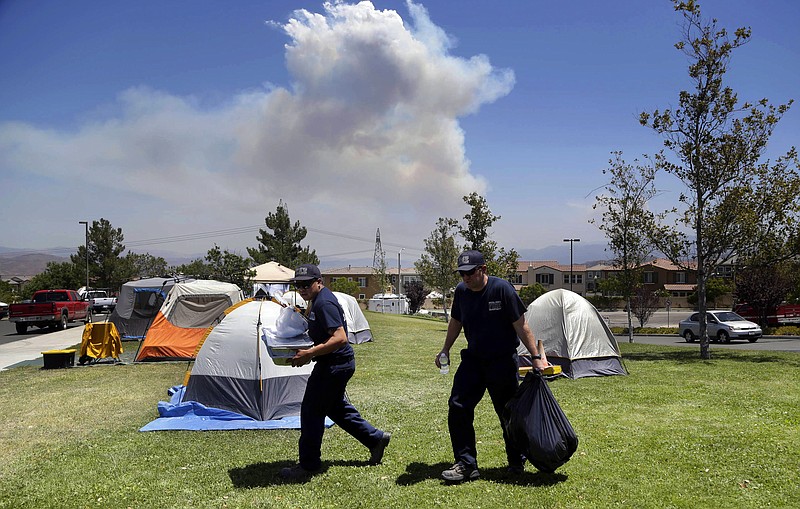SANTA CLARITA, Calif. (AP) - As flames from a raging wildfire raced down mountainsides last weekend toward houses tucked in canyons north of Los Angeles, a sprawling high school campus was transformed into a firefighting supply base - with tents on the football field and enough Gatorade and portable toilets for 3,000 firefighters.
Fuel tankers rolled into the parking lot of Golden Valley High so hundreds of fire trucks could quickly gas up and barrel back down vacant streets in Santa Clarita, where officials had ordered the evacuation of 20,000 residents.
As massive wildfires become the norm in tinder-dry California, the elaborate base camps and supply operations have become the backbone of fighting fires.
The camps are quickly established with military precision at all major fires in the state, with workers moving and preparing massive amounts of food and taking care of other necessities so firefighters can focus on saving lives and property.
After working 16-hour shifts, firefighters in Santa Clarita wearily walked straight to a mess tent next to a mobile kitchen. They shoveled down as much barbecued chicken and ribs as they wanted before passing out inside the tents until it was time to head back out.
Running the supply operation was 74-year-old Jack Van Lear, a retired U.S. Forest Service civil engineer on call for two-week stints every few months as a logistics chief in California's incident command system.
His job is to mobilize all the goods needed at temporary operational bases set up to fight infernos far too large for local fire departments to handle on their own.
Van Lear sprang into action last Friday as the fire driven by erratically changing winds engulfed bone-dry brush in Angeles National Forest that has barely seen any rain over the past few years and fueled the blaze that had threatened 10,000 homes.
His first order was for immediate delivery of a "camp in a box" - ready-to-go trailers used as offices for command personnel and barracks for crewmembers, forklifts for moving pallets of water bottles, firefighting hoses, sleeping bags and gas stoves.
It was 3 a.m. Saturday when Van Lear arrived from his home near San Diego and he was pleased to see that the camp's mobile kitchen and mess tent had been erected and were serving eggs and bacon to famished firefighters, many with soot darkening their faces. Cooks put together sack lunches with calorie-rich grub such as sandwiches, protein bars, chocolate bars and trail mix. Gatorade arrived by the case.
"When we keep our firefighters fed, we keep them happy," Van Lear said.
Justin Correll, a Forest Service public information officer assigned to the camp, praised the meals, singling out a dinner of pork loin that was slow-cooked on a large smoker behind the mess tent.
The next day, Van Lear called in additional showers and laundry facilities so firefighters who came into contact with poison oak could wash themselves and their clothes more often. Kashena Schlipf, who runs the 24-hour mobile laundry unit, estimated her team washes, dries and folds up to 1,500 pounds of pants, shirts, gloves and jackets a day.
As the number of firefighters surged - eventually reaching nearly 3,000 - it quickly became clear to Van Lear that the 30 portable toilets he initially ordered wouldn't be enough.
By Sunday, as the fire spread to more than 50 square miles, Van Lear had secured delivery of several hundred more porta-pottys for the main camp, a remote camp and numerous staging areas. A guard directing traffic just outside the campus had his own toilet just a few yards away.
Camp life has significantly improved over the past several years as the logistics operations get more sophisticated, said Zachary Resnick, a veteran firefighter with the Forest Service's Big Bear Hot Shots team. He especially appreciates the relatively new air-conditioned trailers provided for crewmembers who work night shifts and have to crash during the heat of the day.
"You have laundry, you have your shower, you have your sleep trailer. Everything working together makes a livable experience," Resnick said
The supply operation could not be organized quickly without close cooperation and resource-sharing between local, regional and federal authorities, said Keith Gilless, dean of the college of natural resources at University of California, Berkeley.
He called the incident command system "one of the extraordinary achievements" of U.S. firefighting efforts, and increasingly important as fires break out more frequently with greater intensity and destructive power.
"You've got very defined roles for people, for communications, for logistics," said Gilless, who also heads California's Board of Forestry and Fire Protection. "When an incident occurs in one area, it sets in motion a chain of responses."
Van Lear, who didn't want to sit around after retiring from the Forest Service, always keeps his phone within reach when he's on call.
"You know that call could come any time so you plan your day accordingly," he said within view of a huge plume of acrid smoke from flames scorching hillside vegetation. "My wife doesn't mind."
